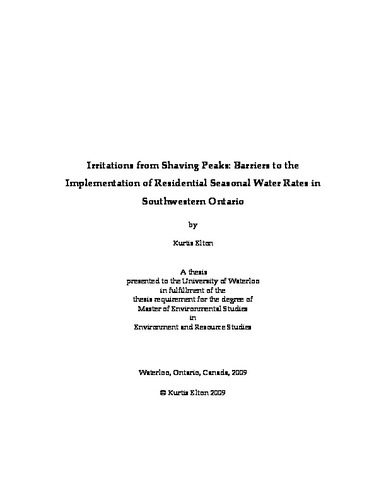| dc.contributor.author | Elton, Kurtis | |
| dc.date.accessioned | 2009-09-01 15:48:11 (GMT) | |
| dc.date.available | 2009-09-01 15:48:11 (GMT) | |
| dc.date.issued | 2009-09-01T15:48:11Z | |
| dc.date.submitted | 2009 | |
| dc.identifier.uri | http://hdl.handle.net/10012/4669 | |
| dc.description.abstract | The water soft path (WSP) has been formulated as a progressive paradigm in water management. The WSP has four main principles: water should be viewed as a service; ecological sustainability is of utmost importance; water quantity and quality should be conserved; and planning should be done from the future backwards, not projected from the present. It may be possible to use conservation-based water pricing programs, especially at the residential level, in order to incrementally implement the WSP. Moreover, the implementation of residential seasonal water rates has been suggested as a method to curb peak demand in municipal water systems, thereby deferring infrastructure expansion. The purpose of this thesis is to answer the question: what are the barriers to implementing residential seasonal water rates in the Region of Waterloo? This question is addressed using a variety of data sources, with the majority of the information coming from academic and non-academic literature, and from interviews with water professionals and local councillors. The results provide a descriptive case study concerning the barriers to implementing seasonal water rates in one particular region of southwestern Ontario, but the conclusions can be generalized to describe some of the barriers to the implementation of seasonal water rates in Ontario. Results suggest that some barriers are more severe than others, and that the more serious ones may be addressed by: expounding the potential for seasonal water rates to curb peak demand; carefully designing a rate study to be administered with non-price programs; and implementing the designed rate structure as a pilot study. It is suggested that the implementation of seasonal water rates can be used as an incremental step towards the adoption of WSP principles, but not without first envisioning a desirable future. | en |
| dc.language.iso | en | en |
| dc.publisher | University of Waterloo | en |
| dc.subject | water demand management | en |
| dc.subject | water soft path | en |
| dc.title | Irritations from Shaving Peaks: Barriers to the Implementation of Residential Seasonal Water Rates in Southwestern Ontario | en |
| dc.type | Master Thesis | en |
| dc.pending | false | en |
| dc.subject.program | Environmental and Resource Studies | en |
| uws-etd.degree.department | Environment and Resource Studies | en |
| uws-etd.degree | Master of Environmental Studies | en |
| uws.typeOfResource | Text | en |
| uws.peerReviewStatus | Unreviewed | en |
| uws.scholarLevel | Graduate | en |

